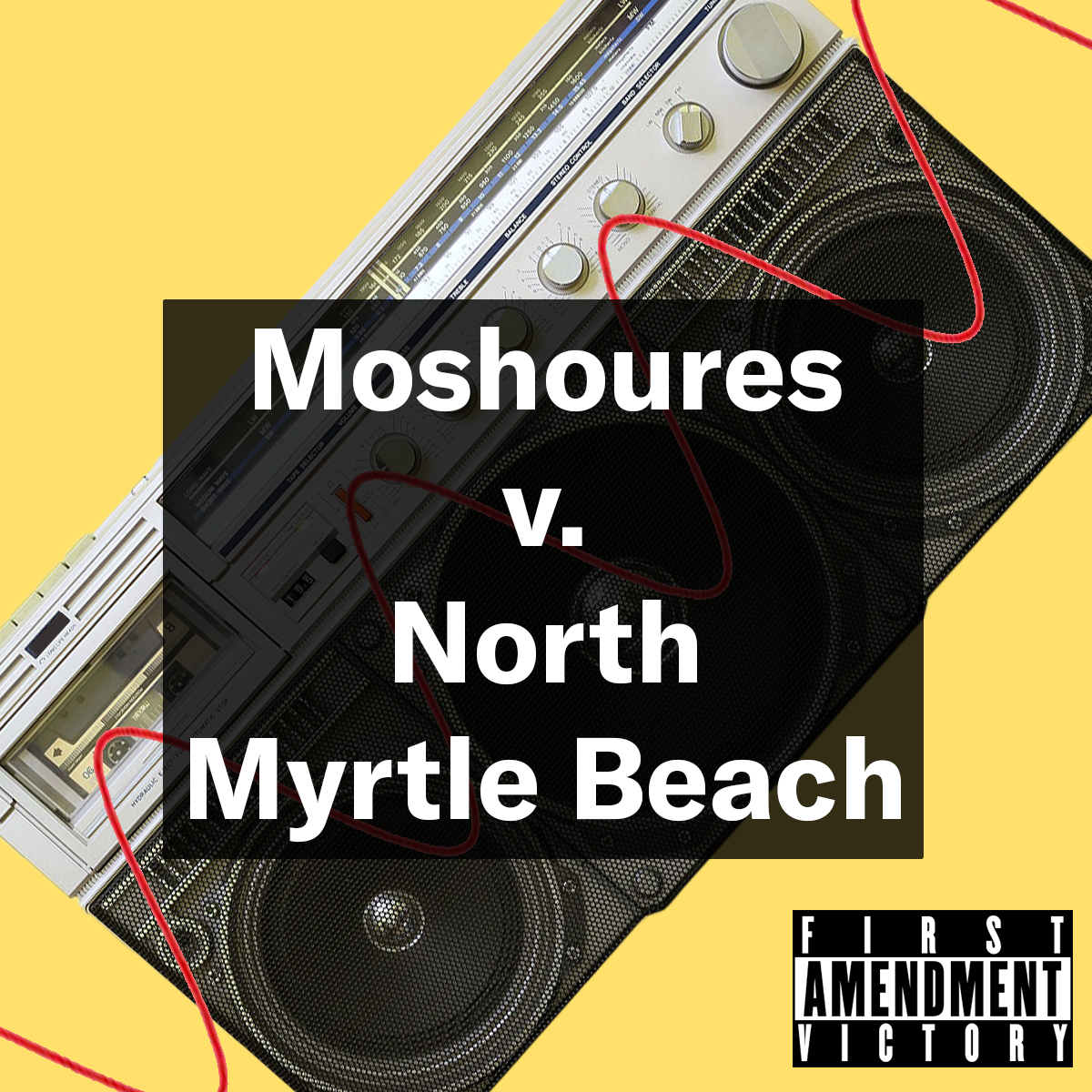Moshoures v. North Myrtle Beach
- Filed: 07/05/2022
- Status: Victory!
- Court: US District Court
- Latest Update: Feb 24, 2023

In the Fall of 2021, the City of North Myrtle Beach considered amending its noise ordinance to prohibit “profane, vulgar, and obscene music” played at a volume greater than 30 decibels—which is roughly equivalent to a whisper, or the noise produced by rustling leaves.
In response, the ACLU of South Carolina wrote a letter to the Mayor and to City Council imploring them to reject this amendment. We explained that the City “has no power to restrict expression because of its message, its ideas, its subject matter, or its content,” and that the City does not have a “compelling interest in enforcing its prudish sensibilities or in maintaining its reputation as a family beach.” We also explained that the ordinance’s use of vague terms like “smutty” and “crude” places far too much discretion in the hands of law enforcement to decide the difference between legal and illegal music.
Despite receiving media attention from our letter and exerting pressure on the Mayor to defend the ordinance, we were unsuccessful at deterring City Council. So, in July of 2022, we filed a lawsuit in federal court challenging the ordinance under the First and Fourteenth Amendments to the United States Constitution. In addition to filing a complaint, we also moved for a preliminary injunction—a court order that the City cannot enforce the ordinance while the case is pending.
On February 23, 2023, Judge Joseph Dawson granted our motion for a preliminary injunction, in part. He ruled that the city’s prohibition on “profane” speech violated the First Amendment, but ruled that the city’s prohibition on “vulgar” and “obscene” speech was sufficiently tethered to the Supreme Court’s definition of obscenity to pass constitutional muster.
Why this case?
The American Civil Liberties Union is—and always has been—firmly dedicated to the freedoms of speech and expression that are rooted in the First Amendment. At bottom, this case is a natural outgrowth of that commitment.
Beyond that, we also hope that by winning this case we can persuade other local governments around South Carolina to trust our credibility when we tell them that their laws violate the constitution. South Carolina has 46 counties and 271 municipalities, with tens of thousands of laws and ordinances on the books. We aim to develop a reputation amongst these local governments for honest legal assessment and predictable and thorough follow-through, with a hope of achieving greater success with fewer lawsuits.
Finally, this case is aligned with our fervent commitment to racial justice and criminal legal reform. As we have shown in other cases, like Kenny v. Wilson, vague laws fling open the door for discriminatory policing. When a law doesn’t create clear lines between legal and illegal behavior, cops are left to use their own bias-fueled discretion to decide what behavior is criminal. As a result, minorities and under-resourced communities are routinely and predictably overpoliced.
The latest
On March 13, 2024, a federal judge ruled that the ordinance's volume restriction on "profane" music is unconstitutionally vague and can no longer be enforced. The ACLU-SC appealed to challenge the volume restriction on "vulgar" music, and on March 11, 2025, the U.S. Court of Appeals for the Fourth Circuit ruled that part of the ordinance is also unconstitutional. To quote from the appeals court's unanimous decision:
“Speech that is not protected by the First Amendment may be prohibited outright — including obscenity, defamation, incitement, and ‘speech integral to criminal conduct’ … What the city may not do is single out a subset of constitutionally protected speech for special disfavored treatment in public spaces because some (or even most) citizens would prefer not to hear it.”
“Obscene” speech remains outside the protection of the First Amendment, as established by long-standing court precedent.
To learn more about this First Amendment victory, see our press release.
- 07/05/2022 ACLU-SC Letter to North Myrtle Beach, Oct. 7, 2021
- 07/05/2022 Moshoures v N Myrtle Beach Complaint.pdf
- 07/05/2022 Motion for Preliminary Injunction.pdf
- 07/05/2022 order_granting_and_denying_in_part.pdf
- 07/05/2022 District Court Order, March 13, 2024
- 07/05/2022 Fourth Circuit Court of Appeals Opinion (March 11, 2025)
Date Filed: 07/05/2022
Court: US District Court
Affiliate: SC
Download documentDate Filed: 07/05/2022
Court: US District Court
Affiliate: SC
Download documentDate Filed: 07/05/2022
Court: US District Court
Affiliate: SC
Download documentDate Filed: 07/05/2022
Court: US District Court
Affiliate: SC
Download documentDate Filed: 07/05/2022
Court: US District Court
Affiliate: SC
Download documentDate Filed: 07/05/2022
Court: US District Court
Affiliate: SC
Download documentLearn More About the Issues in This Case
Stay Informed
Sign up to be the first to hear about how to take action.
By completing this form, I agree to receive occasional emails per the terms of the ACLU’s privacy statement.
By completing this form, I agree to receive occasional emails per the terms of the ACLU’s privacy statement.
